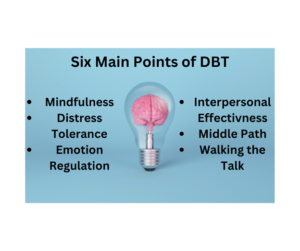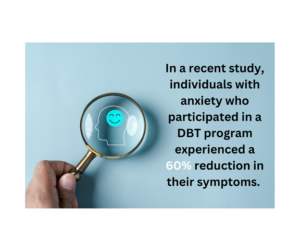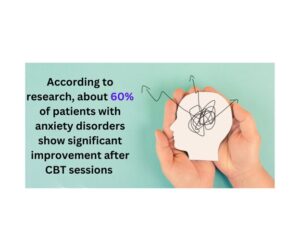Mental health is a concern that affects everyone, directly or indirectly. With the rising prevalence of conditions like anxiety, depression, and addiction, exploring effective treatment approaches is crucial for helping individuals live fulfilling lives. One such approach is dialectical behavior therapy (DBT), which has gained recognition for its effectiveness in treating a variety of mental health issues. At Greater Boston Behavioral Center, we integrate DBT into our treatment programs to provide comprehensive care. This therapeutic approach combines elements of cognitive-behavioral therapy with mindfulness practices and emphasizes balance and acceptance. Reach out to us today at (888) 278-0716 to begin healing.
DBT was developed by psychologist Marsha M. Linehan and was initially designed to treat individuals with borderline personality disorder. However, it has since been adapted for and proven effective in treating a range of conditions, including anxiety, depression, addiction, and eating disorders. In fact, anxiety disorders are among the most common mental health issues in the U.S., affecting over 40 million adults annually. With such widespread impact, therapies like DBT and acceptance and commitment therapy (ACT) have become vital tools in mental health treatment.
What Are the Six Main Points of Dialectical Behavior Therapy (DBT)?
To fully understand DBT, let’s explore its six main points and how they contribute to the overall effectiveness of this therapy.
- Mindfulness DBT places a strong emphasis on mindfulness, which involves being fully present in the moment and cultivating awareness of one’s thoughts, feelings, and surroundings. Mindfulness exercises, such as deep breathing and body scans, help individuals regulate their emotions, reduce impulsive behaviors, and develop a sense of calm and clarity. This focus on the present moment is particularly beneficial in treating anxiety, where future-focused worries often dominate.
- Distress Tolerance Life can be filled with challenging situations that trigger distressing emotions. DBT teaches individuals healthy ways to cope with these situations without resorting to harmful behaviors. Techniques such as self-soothing, distraction, and radical acceptance help individuals navigate through difficult moments and build resilience. This skill is critical in day treatment programs where clients often practice these techniques in real-time under the guidance of trained professionals.
- Emotion Regulation Many individuals struggling with mental health issues find it challenging to identify and manage their emotions effectively. DBT provides strategies and skills to help individuals understand and regulate their emotions in a healthy manner. This includes recognizing and labeling emotions, learning to tolerate distress, and developing positive coping mechanisms. In group therapy settings, these skills can be practiced with peers, fostering a supportive environment for growth.

- Interpersonal Effectiveness Our relationships play a vital role in our overall well-being. DBT recognizes the challenges individuals may face in their interpersonal interactions and focuses on teaching effective communication and problem-solving skills. By improving interpersonal effectiveness, individuals can build healthier relationships, reduce conflicts, and enhance their overall quality of life. In a study on DBT’s impact, participants reported significant improvements in their relationship satisfaction .
- Middle Path Finding balance is crucial in DBT. This point emphasizes the importance of accepting oneself as they are while also working towards personal growth and change. It encourages individuals to embrace the concept of the middle path, where acceptance and change coexist. This balanced approach helps individuals avoid extremes and promotes self-compassion and self-improvement.

- Walking the Talk DBT is not just about learning skills in therapy sessions; it’s about applying those skills to real-life situations. This point highlights the importance of practicing and integrating the skills learned in therapy into daily life. By consistently applying these skills, individuals can experience long-lasting positive changes in their behavior, emotions, and relationships.
The Effectiveness of DBT
The effectiveness of DBT is supported by numerous studies and success stories. Research has shown that DBT can significantly reduce self-harming behaviors, suicide attempts, and hospitalizations among individuals with borderline personality disorder. It has also been found to be effective in treating other mental health conditions, such as anxiety and depression.
For example, in a recent study, individuals with anxiety who participated in a DBT program experienced a 60% reduction in their symptoms. Group therapy, as part of DBT, has also been shown to enhance the therapy’s effectiveness by providing a space where clients can practice new skills with the support of others facing similar challenges.
Comparing CBT and DBT: Which is Right for You?
At Greater Boston Behavioral Health, we offer a range of therapeutic approaches to address various mental health challenges, including Cognitive Behavioral Therapy (CBT) and Dialectical Behavioral Therapy (DBT). Both therapies are effective, but they serve different purposes and are suited for different types of mental health conditions.

Cognitive Behavioral Therapy (CBT)
Cognitive behavioral therapy (CBT) is a widely used and evidence-based treatment that focuses on identifying and changing negative thought patterns and behaviors. It’s particularly effective for conditions like anxiety, depression, and PTSD. The core idea behind CBT is that our thoughts, feelings, and behaviors are interconnected, and by changing negative thoughts and beliefs, we can positively influence our emotions and actions. According to research, about 60% of patients with anxiety disorders show significant improvement after CBT sessions .
Dialectical Behavioral Therapy (DBT)
DBT, on the other hand, was originally developed to treat borderline personality disorder but has since been adapted to help individuals with a range of conditions, including self-harm, severe depression, and eating disorders. DBT combines CBT techniques with mindfulness practices and emphasizes the balance between acceptance and change. It teaches skills in four key areas: mindfulness, distress tolerance, emotion regulation, and interpersonal effectiveness.
Which One is Right for You?
The choice between CBT and DBT depends on your specific needs and the nature of the issues you’re facing. CBT is highly effective for those dealing with anxiety, depression, and other mood disorders. DBT, with its additional focus on mindfulness and emotional regulation, is often the preferred choice for those struggling with self-harm, trauma, borderline personality disorder, or severe emotional dysregulation.
Success Stories and Accessibility
One success story involves a young woman named Sarah who struggled with severe anxiety and self-destructive behaviors. Through DBT and ACT at Greater Boston Behavioral Center, she learned skills to manage her emotions, cope with distressing situations, and improve her interpersonal relationships. Over time, Sarah experienced a significant reduction in her anxiety symptoms and developed a newfound sense of hope and resilience.
DBT is available in various mental health treatment centers, day treatment programs, and outpatient therapy programs in Boston and across the country. If you or a loved one is seeking effective treatment for mental health issues, consider exploring DBT as a viable option. With its holistic approach and evidence-based techniques, DBT can provide the tools and support needed to achieve lasting recovery and well-being.
Conclusion
Dialectical behavior therapy (DBT) offers a comprehensive approach to treating mental health conditions. By incorporating mindfulness, distress tolerance, emotion regulation, interpersonal effectiveness, the middle path, and walking the talk, individuals can develop the skills necessary to lead fulfilling lives. With its proven effectiveness and success stories, DBT is a valuable therapy option that can bring about positive change and recovery. If you or someone you know is struggling with mental health issues, consider exploring DBT as part of your journey towards healing and growth. Remember, you are not alone, and there is hope for a brighter future. Call us today at (888) 278-0716 to begin healing today.

